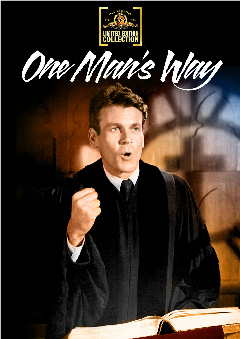
ONE MAN'S WAY
US, 1964, 103 minutes, Black and White.
Don Murray, Diana Hyland, William Windom, Carol Ohmhart, Virginia Christine.
Directed by Denis Sanders.
One Man's Way is the film biography of Methodist preacher, Norman Vincent Peale, the author of the best selling The Power of Positive Thinking. In many ways, this is a typical American religious film - a little too much nobility, heroic suffering and tear-jerking. For this reason it might have very limited appeal. And yet it portrays a particular way of American and religious life which has been influential in moulding the attitudes of the silent American majority in a widespread Protestantism that relies on a deeply personal faith encouraged by the preached word. A similar kind of film as A Man Called Peter.
Don Murray tackles a difficult role well. (He was also the cinema Jesuit, Fr. Dismas Clark, The Hoodlum Priest, and directed The Cross and the Switchblade).
1. This is obviously a 'religious' film. Why - its subject, or its Methodist background, or its effect on the audience?
2. Did the type of religion, of Christianity, appeal to you? For what reason?
3. Did you find the film too 'American' or too full of sentiment? Why?
4. How would you characterise the type of Christianity of Norman Vincent Peale? How like Billy Graham was he? Note the episode of the girl in the collapsed buildings, his sermons, the girl in the coma.
5. What kind of man was he? What kind of personality? How did his life as a reporter, his wooing of Ruth show you his personality?
6. What was the nature of his call? How strong were his convictions? Do you think it was a genuine call?
7. What impact did the sermons make on you? Even if the style was not to your taste, did you find he communicated some religious values to you?
8. Did Peale communicate to you anything of the reality of God. or did God remain on the level of what the reporter said at the beginning. 'pea soup'?
9. What was the main teaching underlying his book? What did he mean by saying that God meant every human being to be a success? How right was he?
10. Did he make the right decision in staying on at his New York church? What convinced him? How did the sequence of the girl in the coma impress you?
11. Do you think this film would have a wide appeal? To whom would it appeal? Why?